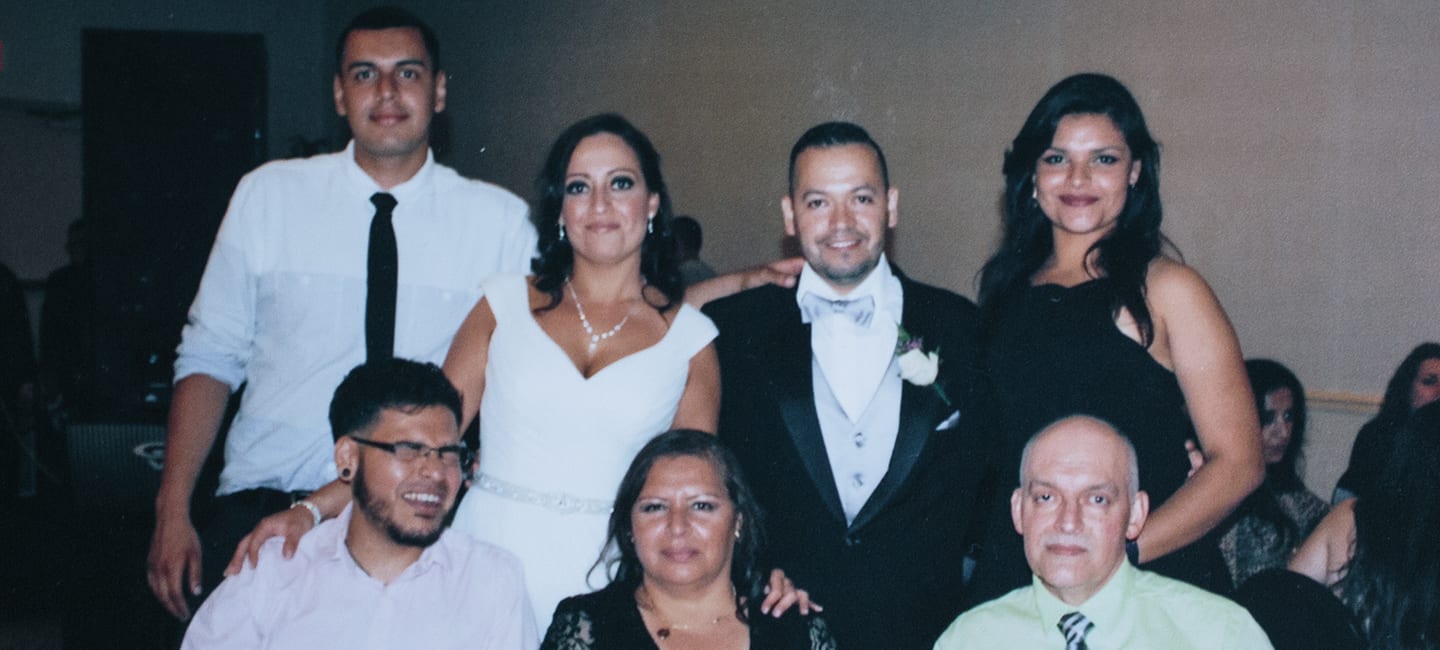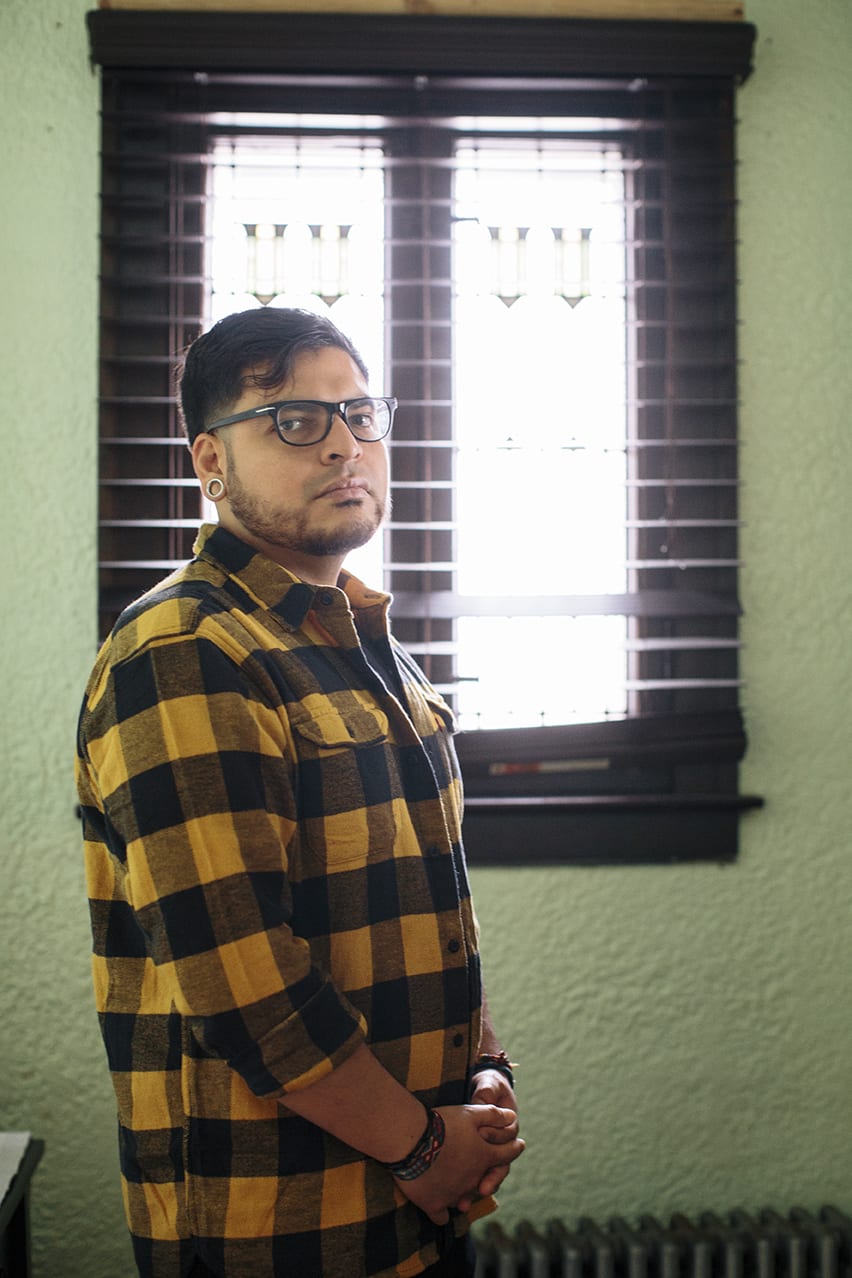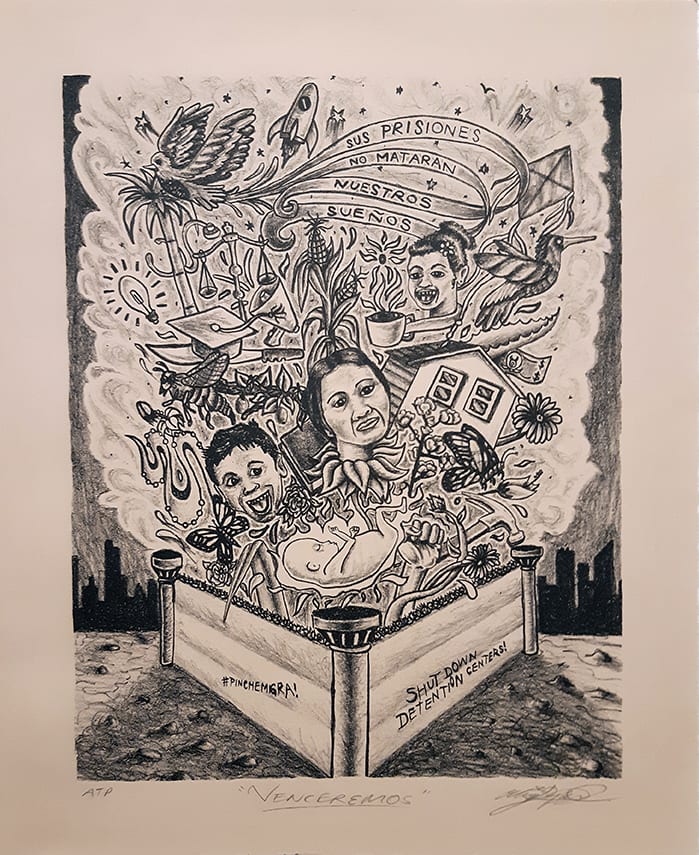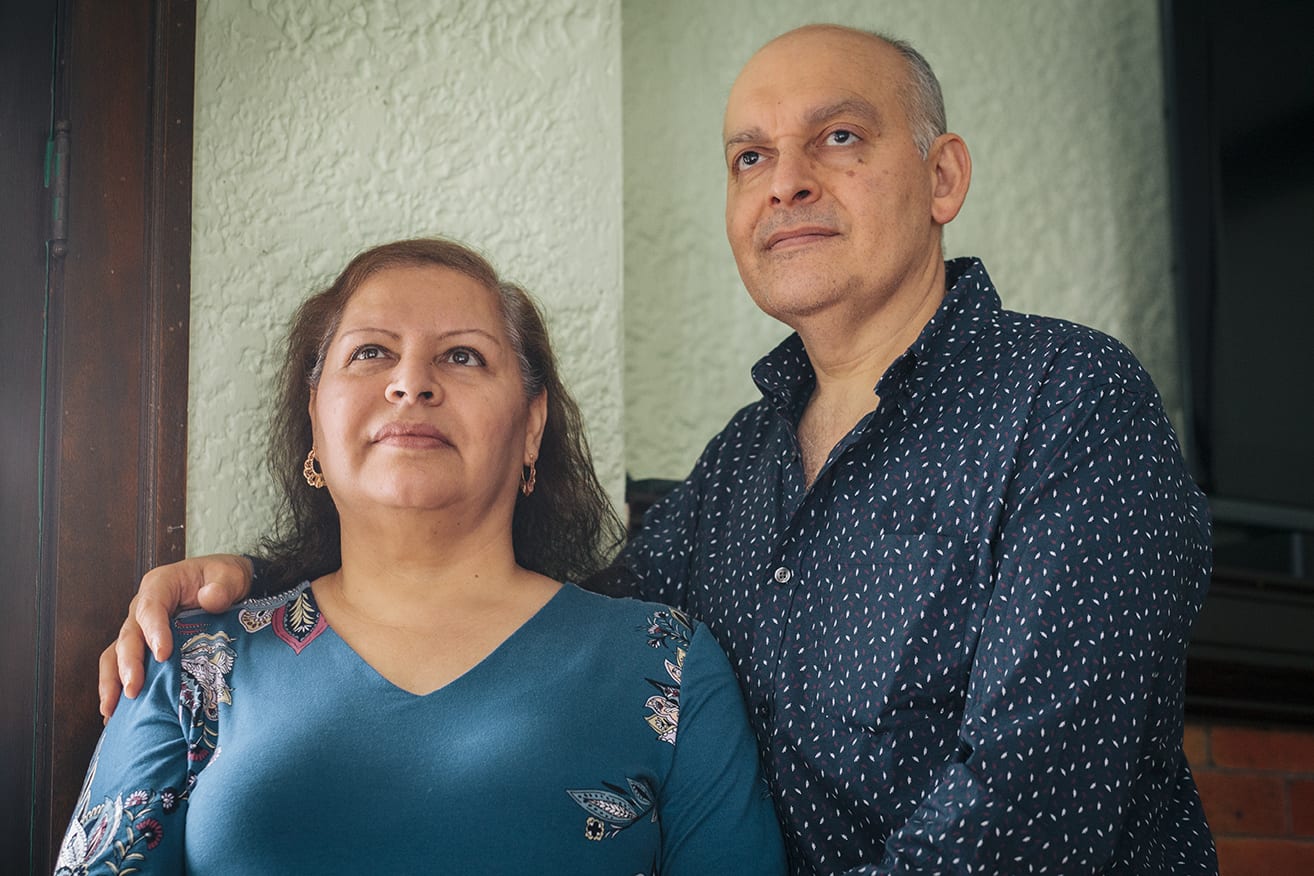 Photo courtesy of the Lopez Gutierrez family
Photo courtesy of the Lopez Gutierrez family After ICE detained Jesus Alberto “Beto” Lopez Gutierrez on his drive home from camping, his family has banded together to challenge his detention and deportation.
Above: Jesus Alberto “Beto” Lopez Gutierrez, his aunt, Isabel, Victor, sister, Mariela, brother, Miguel L., and mother and father, Lourdes and Miguel pictured at Isabel and Victor’s wedding. Photo courtesy of the Lopez Gutierrez family
UPDATE June 10, 2020: After re-detaining Beto on June 9, ICE deported Beto to Mexico. OCAD is fighting to bring Beto home.
UPDATE April 14, 2020: Beto was released on bond from immigration detention at the end of February. Beto is currently appealing his order of deportation and is waiting to hear back from USCIS about his DACA renewal application, which was submitted quickly after his release from detention. OCAD is continuing to organize around his case and those of other DACA-eligible individuals.
Jesus Alberto “Beto” Lopez Gutierrez, 24, was on his way home from a camping trip with friends, when their car was pulled over by police in Iowa and officers then transferred him to Immigration and Customs Enforcement (ICE) custody. Since May 2019, Gutierrez has been held in immigration detention.
ICE has refused to release Gutierrez, despite qualifying for Deferred Action for Childhood Arrivals (DACA), an immigration program that provides protection from deportation for some individuals brought to the U.S. as children. With the help of his family, Gutierrez is fighting his deportation in order to remain in Chicago with them. He has filed a federal lawsuit against the agency for failing to review his DACA eligibility and a lawsuit against the local ICE office in Minnesota for his prolonged detention.
Undocumented immigration activists across the country have seen an increase in targeted immigration enforcement actions by the Trump Administration. They believe these actions are designed to punish their political activism. Despite the threat of retaliation, Gutierrez’s brother Miguel L. has been publicly leading the fight for his release.
Miguel and his family sat down with Borderless Magazine to discuss why they are waging a public campaign against ICE and to share their story with others who have family members in detention.
As told to Irene Romulo.
Miguel L. pictured in his home on Jan. 23, 2020. Photo by Michelle Kanaar.
Miguel L.
Miguel is currently a full-time organizer with the Chicago-based Organized Communities Against Deportations (OCAD). The group organizes with people in deportation proceedings. He is also an artist who believes that art is a critical tool for liberation which allows communities to visualize a different, better world.
Beto is my younger brother. We are three siblings and he’s the youngest one. He’s a really caring and loving human being but of the three of us he’s been a little bit more shy. He’s always had so many friends. When we left Mexico, the last day that we went to school I remember I felt really bad about coming over here [to the U.S.]. So I didn’t tell anybody that I was leaving, I just disappeared. But I remember, for Beto it was his last day and all his friends walked him home. It was like 15, 20 kids behind him.
He was actually celebrating his birthday [when he was detained] with friends on a camping trip. Beto didn’t come back and he didn’t call us so it was weird. I was heading to work when I got a call from this weird number. I answered and it was him. He was like, “Hey, I got arrested. Let me give you my A-number.” I was like, “Fuck.” I asked him, “Are you with ICE? Did ICE get you?” He said, “Yes, they transferred me to ICE.” It was a weird feeling. It was like being there but not being there, like I was floating.
I work in after-school programs teaching art. I was giving the class, I was talking, doing all the things, but at the same time I felt like I was not present. What was going through my mind was, how am I going to tell my parents? That was the worst. I didn’t want to do it. How do you tell your parents that your brother has been taken by ICE?
Everything we’ve been doing for Beto we would do it for anybody else. We know that humans do not deserve to be in cages. But just having your brother in there, it affects you even more because I’m the point person in my family. The pain that you have inside and also seeing your whole family is hurting, it’s a lot more weight. It’s a lot more difficult, carrying all this work.
As painful as it has been it has also been a learning experience for all of us. I have been able to have conversations with my family about how these things that happen to us are not just because God wants them to happen but because there are systems, there’s governments, there’s things in place making all these things happen.
I come from a traditional Catholic family, [growing] up we’ve been taught that whether you do good in life or bad depends on what God wants for you. I had the privilege of going to community college for some years and that helped politicize myself and understand that there’s economic and political systems created by men. I have been able to understand how our current situation, our everyday life, the fact that we’re working class, all of that, people have shaped it and they have names and faces. They’re not gods.
My family has been able to understand how the laws that exist, the racist police departments that exist, ICE, the fact that it exists, all these things are shaping the experiences that happen to us as people of color, as undocumented people living in the U.S. We need to have faith in what we are doing and the fact that my brother is going to be released. But, at the same time we can’t just pray and not do anything.
The main challenge [we face] is that there’s nothing that supervises what [ICE] do. They do what they want and they use whatever is in their power to block people from being released although they qualify for relief. Another challenge has been the fact he’s detained away from us. He’s not close to us. I feel like that has been a challenge because of the extra amount of resources that we’ve had to come up with. For example, to travel to Omaha to be present in his court hearings. We were able to do that twice and we got a lot of support from people there and here but it’s a challenge that he’s all the way over there and ICE didn’t want to transfer him closer to us.
Something that makes it less tangible for Beto to be released is that DACA is not a law. It’s just an executive order so, even though DACA says that folks [that qualify] have to be considered for release, ICE still has discretion to not release him.
Maybe [I’m taking a risk fighting for Beto] but I don’t like to think about it. As part of the fight to get my brother out we have also been in communication with other people that have had DACA and have been in deportation proceedings. This compa we talked to in California she was actually placed in deportation proceedings because she was fighting her mom’s deportation. If ICE wants to they can retaliate. But I’m okay with taking the risk to fight for my brother or anybody else. Either way ICE still wants to deport us, still wants to detain us. To me, there’s nothing to lose. Just staying quiet is not going to do anything so why not just fight. We have to fight. I love my people and I love my community and we shouldn’t be going through this.
Fighting my brother’s deportation, everything that has to get done has helped me deal with the pain of my brother being detained. Since he’s been in detention I started to feel this guilt that I shouldn’t have fun because my brother is locked up. Like, how can I be having fun when my brother is inside? And I realized I shouldn’t feel guilty for taking care of myself. I’m doing what I can to get my brother out and that’s very important. Telling the story—whether it’s to the news or to folks when I’m asking them to sign a petition—it helps me release those feelings that come out of having your loved one detained.
I would tell people that are going through this to talk about it. It’s healing, sharing the story of what you’re going through. Knowing my undocumented community, we often have [several] jobs to make ends meet. Undocumented folks are so busy with our routines that we often forget to take care of ourselves or to even share what we’re feeling. I’ve noticed it in my own family sometimes talking about these things are taboos—when someone is locked up or in detention. There’s always people [who] may wonder, “Oh well, there must be a reason.” There’s this common idea that people deserve to be in cages. But just the fact that you share, that you start talking about it without feeling guilty then you’re letting all that pain go a little bit. There’s many ways, like storytelling, writing or just talking about it, that help you process things. At least for me, it has helped me feel a little bit more peace inside.
Lithograph titled “Venceremos,” by Miguel L. The title means “We shall overcome, we will win.” Photo courtesy of Miguel L.
I think it’s important to acknowledge the privilege I had that I’d been organizing before this happened. I had a little bit more understanding of how this worked. But when someone is detained it feels really urgent. I would tell folks going through this to get informed or find folks who know how these processes work so that you have a little bit more understanding of what the process is like of someone being detained. Organizing is like a network and it’s all about asking, “Hey, do you know this? Can you help me with that?” Definitely always hearing second opinions from lawyers or community members. We’re often going to hear in the legal route that things can’t move. This is how things are and there’s no other option, but it’s all a matter of being persistent.
Also, if you have the resources to make calls, be in constant communication with the person that is detained to keep them motivated if they’re deciding to fight their case. I think that’s really important because we’re suffering here outside by not seeing them. But at the same time the person inside is also going through different levels of trauma that we can’t know unless we’re there.
In the beginning, Beto was going to sign his voluntary departure. I explained to him how we fight deportations. I told him that we don’t always win but at the same time that the struggle shows ICE that people are going to put up a fight. That they’re not just going to let themselves be taken away from their families. I was not going to promise him something that I know is not sure. So he thought about it for some days and he said, “Yeah, let’s give it a try.” He’s been the one deciding to continue fighting. So I also want to give him a shout-out for being brave and enduring all of that.
One of my favorite art pieces that I’ve done has been a lithographic talking about detention centers. The image is a detention center but it has text to it that says, “Their cages will not kill our dreams.” I did that thinking of all the people that are locked up right now in detention centers and jails. Not just depicting ourselves as victims and people that are locked up and sad, but more with a spirit of motivation of looking beyond the cages. That’s why it says that cages will not kill our dreams, because even though folks are locked up or we are in uncertain situations right now, we know that we still have life ahead of us and we will continue to fight.
Lourdes and Miguel Lopez, Beto’s parents, pictured in their home on Jan. 23, 2020. Photo by Michelle Kanaar.
Miguel (Sr.) Lopez and Lourdes
Gutierrez’s parents, Miguel Lopez and Lourdes, talked about how they are dealing with their son’s detention. Although they both worry about Miguel’s public organizing, they find strength in each other, in prayer, and in witnessing Miguel’s love for his brother.
Miguel (Sr.): Our lives have changed a lot [since Beto was detained]. Before, I used to play music all the time. Since our son has been absent, I feel like we are missing our joy. Sometimes I think that we will not be as complete or happy until he returns. That’s what inspires me [to fight] because we miss him.
We support each other and encourage each other even though it is very difficult. Even so, we pray daily. We don’t forget our son and all the other people who are also detained. We’re really proud of Miguel because he has taught us not to be afraid and to fight for our rights.
Lourdes: Yes, I get [scared]. When we make calls, I wonder if [ICE] are watching us, if they are going to come here, too. Since he has been detained I feel like I live my life very tense, very worried. I know we have nothing to hide and I don’t know if it’s just my nerves but I know that anything can happen. We love our son. He’s our child and I think that a parent will go until the end, no matter what happens, for your children. They are our reason to live and I know he’s suffering being away from us and locked up. We’re suffering too but I think we’ll be with him until the end.
When I hear Beto on the phone I tell him that hearing him gives me strength. Hearing that he wants to fight and that he remains positive gives me courage, motivates me. Sometimes, I wake up at night and I wonder how he’s doing. If he’s asleep or maybe reading. I worry. But hearing his willingness to continue makes me feel better.
I ask God daily to take care [of Miguel] because anything can happen. But I know he is set in helping others despite the risks. I tell him to take care of himself because I notice, as a mother, when he’s worried or when he doesn’t get enough sleep. He has surprised me with everything he has been doing for his brother. He always tells me he’s not doing things alone. I know there’s a lot of people who, even without knowing us, have helped. I am so thankful for that.
This story was co-published in the Chicago Reader. More information on Gutierrez’s public campaign and Mijente’s petition demanding his release can be found here. Individuals in the Chicago-land area who have family members in deportation proceedings can reach out to Organized Communities Against Deportations via Facebook or call the Illinois Family Support Hotline at 855-435-7693.
Irene Romulo is a co-founder of Cicero Independiente, a bilingual local news outlet for people living in Cicero, Illinois.
Borderless Magazine is your source for stories that transcend boundaries. You can support our work with a tax-free donation today.
Donate



